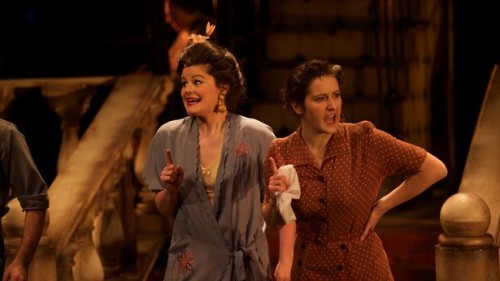 United States Various Composers, Philadelphia Chamber Music Society: Soloists, American Philosophical Society, Perelman Theater, Philadelphia. 1-4.12.2015. (BJ)
United States Various Composers, Philadelphia Chamber Music Society: Soloists, American Philosophical Society, Perelman Theater, Philadelphia. 1-4.12.2015. (BJ)
Month: December 2015
The Triumph of Verdi’s Misunderstood Opera at La Scala’s Opening
 Italy Verdi, Giovanna d’Arco: Orchestra and Chorus of Teatro alla Scala, Milan. Conductor, Riccardo Chailly. Seen and heard in Direct Transmission through RAI at cinema Barberini Rome 7.12. 2015. (JB)
Italy Verdi, Giovanna d’Arco: Orchestra and Chorus of Teatro alla Scala, Milan. Conductor, Riccardo Chailly. Seen and heard in Direct Transmission through RAI at cinema Barberini Rome 7.12. 2015. (JB)
‘Between Two Worlds’: An Interview With Violinist Tianwa Yang
‘BETWEEN TWO WORLDS’: AN INTERVIEW WITH VIOLINIST TIANWA YANG

The dramatic growth in the number of talented artists of Asian origin has been one of the outstanding features of classical music today, indeed sufficiently important to influence the focus of major recording companies and media. Traditionally, the road to exposure for young Asian artists, and violinists in particular, has been straightforward: move to America, gain entrance into Juilliard or Curtis from an early age, and let their budding musical and technical skills be honed by the great teachers. This was the route taken by Kyung Wha Chung originally, and later Cho Liang Lin and Sarah Chang, among many others.
If one looks at the career of 28-year-old Chinese violinist Tianwa Yang, one would think that she must be cut from standard cloth. After all, her virtuoso skills are pristine and her recordings for Naxos, the most enterprising being the complete violin compositions of Pablo Sarasate, have received the highest praise. They have often been cited as a model of ‘the art of the violin’ for their technical accuracy, perception and emotional commitment. Of her more than 20 recordings, she has also received the ECHO Klassic 2015 award as Violin Instrumentalist of the Year for Ysaÿe’s Sonatas for Solo Violin. Yet Ms Yang did all her early studies in China, and in fact did not want to study in America. She recoils at the term ‘virtuoso’ being used to describe her talents, showing almost no interest in the ‘International Violin Olympiad’, as she aptly calls it. Rather, her dream from her teens was to study German chamber music in Germany, and that is eventually what she did. It is a long jump from Schubert to Sarasate or Paganini, so when she visited Vancouver to play Paganini’s 2nd Concerto, I was more than a little intrigued, especially since she apparently had not touched the work for over a decade.
Newsletter Images (do not remove)
This is a placeholder for the Newsletter plugin images. You may edit and reuse this post but do not remove it.
The London Sinfonietta’s Habitual Excellence in Boulez and Stockhausen
 United Kingdom Boulez and Stockhausen: Clio Gould (violin), Sound Intermedia, Royal Academy of Music Manson Ensemble, London Sinfonietta, Wolfgang Lischke (conductor). Royal Festival Hall, London, 5.12.2015. (MB)
United Kingdom Boulez and Stockhausen: Clio Gould (violin), Sound Intermedia, Royal Academy of Music Manson Ensemble, London Sinfonietta, Wolfgang Lischke (conductor). Royal Festival Hall, London, 5.12.2015. (MB)
Carillon Quartet Plays Chamber Music of Polish Composers in Zurich
 Switzerland Chopin, Szymanowski: Carillon Quartet, Yoshiko Iwai (piano), Kleiner Saal, Tonhalle Zurich, 6.12.2015. (RP)
Switzerland Chopin, Szymanowski: Carillon Quartet, Yoshiko Iwai (piano), Kleiner Saal, Tonhalle Zurich, 6.12.2015. (RP)
Zimmermann’s Intriguing Concerto and Bruckner’s Most Majestic Symphony
 United Kingdom Zimmermann and Bruckner: Håken Hardenberger (trumpet), Philharmonia Orchestra,/Andris Nelsons (conductor), Royal Festival Hall, Southbank Centre, London, 6.12.2015. (AS)
United Kingdom Zimmermann and Bruckner: Håken Hardenberger (trumpet), Philharmonia Orchestra,/Andris Nelsons (conductor), Royal Festival Hall, Southbank Centre, London, 6.12.2015. (AS)
